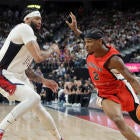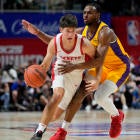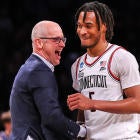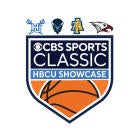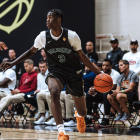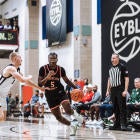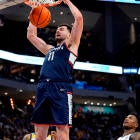It's impossible to know for sure how what's playing out in the Daniel Patrick Moynihan United States Courthouse in lower Manhattan is resonating with a jury reportedly filled with folks who understand little or nothing about college basketball. But the testimony of Brian Bowen Sr. seems to suggest, at least to me, that not guilty verdicts for Jim Gatto, Merl Code and Christian Dawkins, at this point, seem more likely than not.
Simply put, the government's case no longer makes sense.
It's possible it never did.
But it certainly doesn't now.
The charges levied against these three defendants were always flimsy, according to some legal minds. But now they're downright laughable given what Bowen Sr. said under oath Tuesday morning. The government's entire case, you see, is basically rooted in the idea that former Adidas employees Gatto and Code -- plus Dawkins, who is, more or less, an ambitious but sloppy middle-man -- are guilty of wire fraud and conspiracy to commit wire fraud because they paid Bowen Sr. money that made Bowen Jr. ineligible and, in the process, defrauded Louisville. For the purposes of this case, Louisville is considered a "victim."
Obviously, that's a ridiculous notion to anybody who understands recruiting because, in reality, Gatto, Code and Dawkins didn't defraud Louisville. (They helped Louisville!) And Tuesday morning's cross-examination of Bowen Sr. convincingly hammered home that point -- especially when Bowen Sr. detailed how he was accepting money from various people in exchange for his son's services long before Adidas even got involved, and when Bowen Sr. also detailed how former Louisville assistant Kenny Johnson gave him $1,300 cash in June 2017 to help with rent after the family relocated to Louisville. In other words, it's going to be difficult for the government to continue to argue that Gatto, Code and Dawkins made Bowen Jr. ineligible when they were actually late to the money game, relatively speaking. And it's going to be difficult for the government to continue to paint Louisville as a victim when Gatto, Code and Dawkins aren't accused of doing anything other than what a Louisville employee also did himself -- i.e., provide money to Bowen Sr. in violation of NCAA rules.
Meantime, it'll be interesting to see what happens to Johnson.
First-year La Salle coach Ashley Howard hired him to his staff last May in a questionable move for exactly this reason -- specifically because there was always a chance Johnson would get roped back into this scandal regardless of what he told La Salle officials.
"Based on my personal relationship with Kenny, I know him to be an individual of the highest integrity," Howard said via a released statement back in May. Bowen Sr., under oath, said otherwise Tuesday. La Salle officials have yet to comment.
As for the other schools alleged to have offered something for Bowen Jr. -- schools like Texas, Arizona, Oklahoma State, Oregon and Creighton -- Bowen Sr., to date, has either denied any knowledge of the offers, testified he "couldn't recall" the offers or insisted they were offers relayed to him only second-hand by Dawkins. That's good news for the schools listed above because unless there is some corroborating evidence everybody accused of anything will simply call Dawkins a liar, and there's just no way the NCAA is going to levy charges based on nothing more than what Bowen Sr. has said Dawkins told him other coaches said they would do. If there's more, maybe. But if that's it, definitely not.
Either way, we're now a week into this thing and it's hard to dispute that things aren't going well for the prosecution. From the jump, the defendants acknowledged they did everything the government alleged they did but insisted they still committed no crime.
Brian Bowen Sr.'s testimony helps their case, I think.
In this scandal, NCAA rules were broken; nobody denies that. But the end result was Gatto, Code and Dawkins getting what they wanted, Louisville getting what it wanted, and Bowen Sr. getting what he wanted. Everybody won -- until, of course, they got caught. But everybody involved was a willing participant. And, ultimately, it's reasonable to assume the defense will ask the jury these questions: If Brian Bowen Sr. was accepting money for his son's services in violation of NCAA rules before our clients were even in the picture, why are our clients the ones who made him ineligible? And if a Louisville employee was giving cash to Brian Bowen Sr., how did our clients defraud Louisville by doing nothing different than what a Louisville employee also did?
I'm not sure there are good answers for those questions.
Which is why getting a guilty verdict suddenly seems tough.









